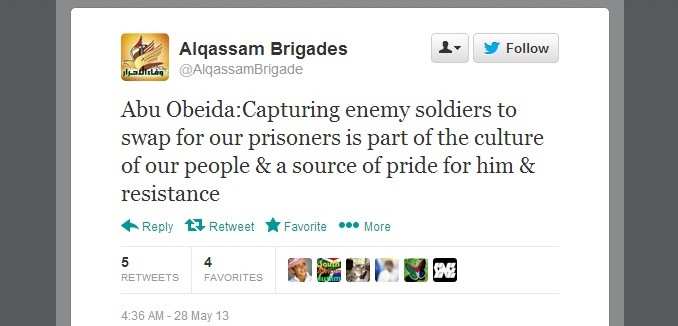A week after an Al Qaeda-linked Somali terror organization urged its followers to conduct operations similar to the Hamas kidnapping of Israeli soldier Gilad Shalit, a Hamas spokesman reaffirmed his organization’s embrace of the tactic that it pioneered.
Palestinian President Mahmoud Abbas – whose Fatah faction rivals Hamas – had issued a statement indicating that the kidnapping of Israelis was an unsound tactic. A Hamas spokesman responded via Twitter. Known by his nom-de-guerre Abu-Ubaida – Facebook here – the Ezzedeen Al Qassam Brigades spokesman tweeted in response that capturing enemy soldiers to swap for Palestinian prisoners was part of Palestinian culture and a source of pride.
Abu-Ubaida scoffed at Abbas, emphasizing that “Those who refuse to abduct Zionist soldiers renounce the pain and suffering of thousands of prisoners yearning for freedom.”
At a press conference hosted yesterday in Jerusalem by The Israel Project, Justice Minister Tzipi Livni addressed the threat posed by Hamas:
“A legitimate question is with whom we are going to sign an agreement,” Mrs Livni said in a speech at Jerusalem’s landmark King David Hotel. “In the past, we had ties with those who wanted to make peace with Israel but couldn’t deliver. And sometimes we had those who didn’t want to make peace with Israel but they were strong enough to deliver. Now we have both… “The Gaza Strip is being controlled by Hamas. They are not part of the peace. They are not willing…..to accept Israel’s right to exist, to renounce terrorism and to accept all the agreements between Israel and the Palestinians.”
Livni suggested a “dual strategy,” where peace talks would be pursued with relatively moderate Palestinians alongside international efforts to isolate and delegitimize Hamas.
Despite an ongoing effort to resolve the bitter rivalry between Hamas and Fatah, reconciliation talks last week again failed to bridge the gaps. Only hours after Abu-Ubaida’s comments, Fatah security forces arrested four Hamas operatives in the West Bank, underscoring the deep divisions between the two main Palestinian factions.




